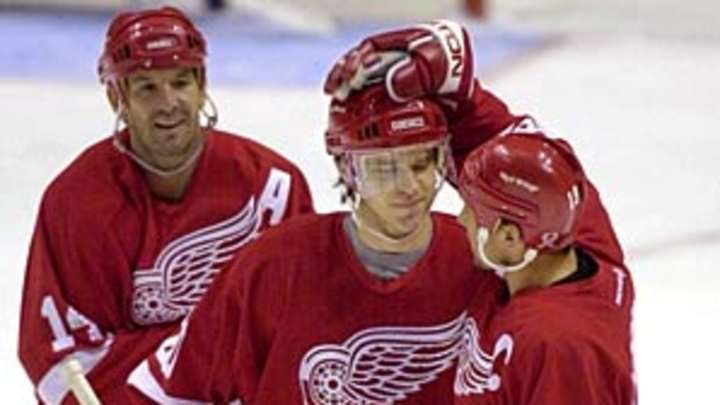A former teammate's memories of Lucky Luc and Stevie Y

He came into the NHL as an awkward-skating scoring phenom from the QMJHL. I remember his first couple of training camps with the L.A. Kings where he was slender of build and coltish on his skates. When he showed up for camp as a rookie in 1986, he was bigger and his stride was much stronger. All of a sudden, his offensive instincts, soft hands and determination to get to the net were applicable at the NHL level.
Part of it was simply physical maturity. We were sitting next to one another in the locker room at training camp in Victoria, British Columbia in 1986 and I asked him what he did training-wise during the summer. Luc went into a gush about this new concept called rollerblades, which he used to train off-ice during the offseason. As he described roller skates with wheels repositioned in a straight line attached to the boots of his old hockey skates, I was impressed with his dedication to work on a specific aspect of his game that needed improving.
Unfortunately, my business foresight didn't match Robitaille's. I dismissed rollerblades as a dubious training tool with little mass appeal. Luc, on the other hand, went on to a superb career and continued to display sharp business acumen with his involvement in rink development in California. Today he is a newly-inducted Hall of Famer -- in a distinguished class with Steve Yzerman, Brett Hull, Brian Leetch and Lou Lamoriello -- as well as the VP of Business Operations for the Kings. I couldn't have predicted it sitting in that training camp locker room back then, but I'm not surprised now.
On the other hand, people early on mistook Yzerrman's serious, thoughtful persona as standoffish aloofness -- selfish even. Those portrayals came from the uninitiated. He grew up in public as the captain of the rebuilding Detroit Red Wings and grew into a champion and renowned leader. But at the core, Yzerman wasn't a talent-first or offense-only hockey player. He was as driven a player as I ever witnessed.
When I went from the Kings to the Wings in 1987, I got to see this attribute first-hand. Times were better for Detroit, but it was quite chaotic and somewhat dysfunctional under blustering bench boss Jacques Demers. It was a team and an organization still in transition with a young captain amidst a host of aging veterans of varying pedigrees and backgrounds. And work habits. Those were rollicking times with characters like Harold Snepsts, Lee Norwood, Mike O'Connell, Tim Higgins and Brent Ashton co-existing with young tough guys Bob Probert and Joe Kocur and play-making whiz Adam Oates.
Despite the color and carousing, the one enduring image I have is of Yzerman working out. After practice. After games. While the rest of the gang was making plans to go to lunch or dinner or whatever, he diligently, quietly and resolutely focused on elevating himself from a player with star potential to being a superstar. That journey would continue for the Red Wings and Yzerman for the next decade before they finally won the Stanley Cup in 1997. At the heart of it all was the captain, his personal growth on and off the ice mirroring that of the Red Wings as a whole.
Yzerman and the Wings would go on to win two more Cups with number 19 as captain and another with him as part of the front office management team, but the one title that stands out to me was in 2002. That's where my memory of Robitaille and Yzerman merge, fully 15 years after the path of my blip of a career intersected with these two who would go on to greatness.
I was on the ice as Yzerman hoisted the Stanley Cup for the third time, fortunate enough to be part of the proceedings as an analyst for Westwood One's national radio coverage. Yzerman beamed as he held the Cup high, surrounded by family -- he was now a father far removed from the wide-eyed, baby-faced 18-year old who had arrived in the Motor city almost 20 years earlier. His smile lit up the building and masked much of the marring his face had endured during his rugged ascent to the pinnacle.
Then came Robitaille -- he of the gaudy offensive numbers, but never a championship. Emotions overwhelmed him. He was crying openly as he tried to answer my perfunctory questions. He'd finally achieved after 16 seasons what every hockey player dreams of.
The raw, real emotion of a beaming Yzerman acknowledging the adoring Wings' faithful and the tears of joy flowing from Robitaille as he reveled in the moment moved me. That unfettered outpouring was powerful and I felt genuinely happy for them. As I am now.
Congratulations to Luc Robitaille and Steve Yzerman. Thanks for the Hall of Fame memories.
